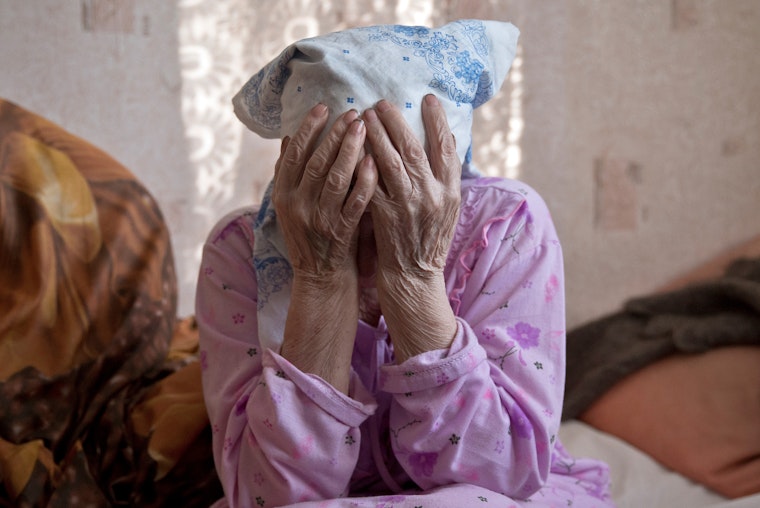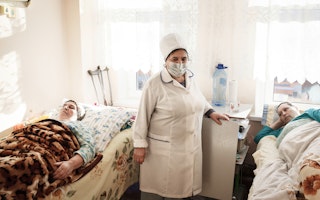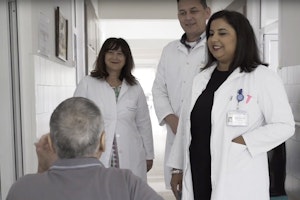Ukraine Applies Anti-Torture Standards to Health Care
By Naomi Burke-Shyne

In late 2014, Kseniya Shapoval received a phone call from a young woman named Oksana in Western Ukraine. Oksana’s grandfather, suffering from terminal cancer, was discharged from the hospital three days before his death without pain medication. He died crying in agony.
Oksana wanted to make sure no one else suffered the way her grandfather did, so she contacted Shapoval after hearing about her work on palliative care with the International Renaissance Foundation, Open Society’s foundation in Ukraine.
Shapoval investigated the situation, and realized further scrutiny was required to understand why Oksana’s grandfather had inadequate access to pain medication.
Thanks to Ukraine’s formal monitoring mechanism, Shapoval was able to take action.
In 2013, the UN Special Rapporteur on Torture found that severe abuses in health care settings amount to cruel, inhumane, and degrading treatment, and even torture. The Special Rapporteur further pointed out that denial of care is also an issue—for example, denial of essential pain relief medications (including morphine or opioids) due to an inadequate supply of medications, or policies that prioritize drug control over patients’ rights.
Ukraine has applied this novel approach to patient rights. It draws upon the state’s obligations under the Convention against Torture and Optional Protocol to prevent acts of torture and other cruel, inhuman, or degrading treatment.
Specifically, the Optional Protocol introduces a system of independent national monitoring bodies collectively known as the National Preventive Mechanism (NPM). The NPM is mandated to conduct regular visits to places where persons are deprived of their liberty. Crucially, the phrase “places where persons are deprived of their liberty” is interpreted more broadly than places of detention, and includes a range of closed facilities.
Dr. Andrey Rohansky, trained as both a doctor and a lawyer, brings a unique perspective to the challenges surrounding patient rights in his role as executive directive of the Institute of Legal Research and Strategies. Rohansky joined forces with Shapoval and human rights advocates to argue that closed health facilities—where a person is not free to leave—amount to places where people “are deprived of their liberty.”
In 2014, the Ukrainian NPM agreed, and further stipulated that palliative care patients need special rights protection. The NPM determined that palliative care hospices can conditionally be interpreted as places of detention due to the high degree of control exercised over patients’ living conditions.
Around the time of Oksana’s call, the NPM embarked upon its first monitoring visit to a closed health facility. Shapoval and Rohansky joined the group as civil society experts.
At Shapoval’s proposal, the NPM conducted a monitoring visit to Oksana’s grandfather’s hospital in Western Ukraine. The visit revealed a number of significant issues including weak prescription and discharge protocols, which resulted in patients frequently being discharged without pain medication. The NPM official report and recommendations for the hospital were submitted to the Ministry of Health and local government.
A follow-up NPM visit was conducted in March 2015, revealing the district health department had responded to the report and recommendations. This response included terminating the employment of the doctor overseeing the hospital, and conducting training for doctors on prescriptions, record keeping, and pain management for discharged patients.
Proving itself to be a valuable tool for patient rights, the NPM has now monitored eight closed facilities and has followed up with reports and recommendations. This innovative use of the NPM has the potential to improve conditions at a systemic level, and uphold the dignity of the sick and most vulnerable in society.
Update (September 11, 2015): The title of this post has been edited for accuracy.
Until October 2017, Naomi Burke-Shyne was a senior program officer working with the Law and Health Initiative and the International Harm Reduction Development Program.


